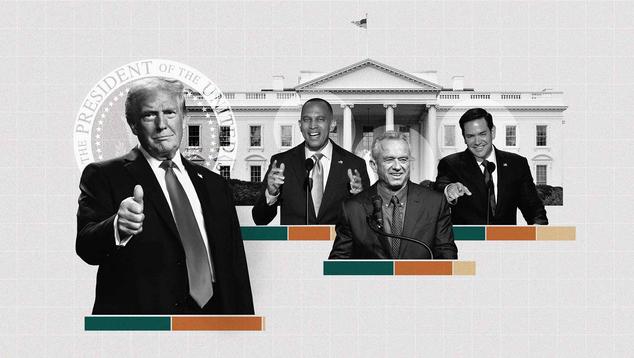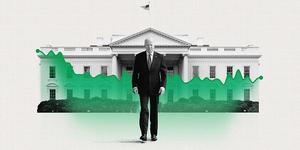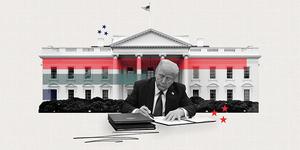WASHINGTON, D.C. -- Americans have more positive than negative opinions of just a few of the 14 prominent U.S. political figures tested in a new Gallup survey. Secretary of State Marco Rubio, House Minority Leader Hakeem Jeffries, and Secretary of Health and Human Services nominee Robert F. Kennedy Jr. have favorable ratings that exceed their unfavorable ratings by seven or eight percentage points. However, at least one in four U.S. adults are not familiar enough with Rubio and Jeffries to rate them.
Several other figures, including President Donald Trump, Vice President JD Vance, Speaker of the House Mike Johnson, Senate Majority Leader John Thune, National Intelligence Director nominee Tulsi Gabbard, and businessman and Government Efficiency Department adviser Elon Musk get similar favorable and unfavorable ratings. Nearly all Americans have an opinion of Trump -- 48% rate him positively and 50% negatively -- but close to half are unfamiliar with Thune and Gabbard.
Politicians rated significantly more negatively than positively include Secretary of Defense Pete Hegseth, Senate Minority Leader Chuck Schumer, Rep. Nancy Pelosi, Rep. Alexandria Ocasio-Cortez and former Vice President Kamala Harris. Hegseth, Ocasio-Cortez and Schumer are also less well-known to Americans.
These findings are from a Jan. 21-27 Gallup poll conducted in the days after Trump and Vance were inaugurated and as members of the new administration were confirmed by the Senate (Rubio and Hegseth) or preparing for confirmation hearings (Kennedy and Gabbard).
Trump’s 48% favorable rating is the highest among these political figures, while his 50% unfavorable rating is also among the highest, just behind those of Pelosi (56%) and Harris (53%). After Trump, Kennedy (46%), Musk (43%), Vance (42%) and Harris (42%) have the next highest favorable ratings.
Hegseth, Gabbard and Thune are the least well-known among this group, while Trump, Harris, Pelosi and Musk are the most well-known.
Independents Neutral or Negative on Almost All Political Figures
As would be expected, partisans are mostly positive toward political figures aligned with their preferred party and quite negative toward those aligned with the other major party. Republicans’ favorable ratings of the five Democratic figures are 11% or lower, while their favorable ratings of Republicans are no lower than 50% (with unfavorable ratings no higher than 12%). There is slightly more variation in Democrats’ ratings of Democratic versus Republican politicians, but the larger pattern holds.
Political independents give similar positive and negative ratings to Trump, Vance, Rubio, Johnson, Thune, Gabbard and Jeffries. They hold significantly more unfavorable than favorable opinions of Musk, Hegseth, Ocasio-Cortez, Pelosi, Schumer and Harris. Kennedy, the former Democrat and once third-party presidential candidate, is the only figure whose rating among independents is significantly more positive than negative (43% favorable, 36% unfavorable).
Among the better-known politicians, Republicans view Trump most favorably, at 93%, while Vance, Musk and Kennedy each receive favorable ratings of 80% or higher.
Harris earns Democrats’ highest favorable rating (87%), while the other Democratic Party figures are viewed positively by at least two-thirds of Democrats. Ninety-two percent of Democrats rate Trump unfavorably, the highest negative rating given by either major party group.
Trump's Overall Favorable Rating One of His Best
Trump’s 48% favorable rating is unchanged from a November 2024 postelection survey but remains above the 44% taken immediately before the election. His current favorability score trails a 50% reading in 2005 -- the only time he had a net-positive rating -- and a 49% measurement in April 2020 as his best to date.
Other notable findings comparing current ratings to past trends include:
- Vance’s image has improved, with his neutral rating today (42% favorable, 40% unfavorable) contrasting with more negative than positive ratings of him in October and all prior readings back to August.
- Harris’ 42% favorable rating is unchanged from the November postelection poll after Trump defeated her for the presidency, but it remains less positive than toward the end of the presidential campaign when 49% held a positive opinion of her. However, Harris is better liked than before she became the Democratic nominee, based on a 34% favorability rating in June.
- Johnson and Jeffries have both seen slight improvements in their public images from November’s postelection survey. Johnson’s favorability has ticked up to 36% from 33%, while his unfavorability has dipped to 35% from 38%, shifting opinions of him from net-negative to evenly split. Opinions of Jeffries were divided in November (31% favorable, 32% unfavorable) but are net-positive now.
- Pelosi’s 33% favorable rating is down from 38% in November 2022, after her party lost its majority status in the House, and 44% in January 2021, taken mostly after the Jan. 6 Capitol riots. Pelosi was viewed positively, or equally positively and negatively, early in her congressional leadership career, a pattern seen in ratings of Johnson and Jeffries now. But like most House speakers who remain in the position for years, opinions of her became more negative over time.
- Albeit negative, Schumer’s ratings have been relatively steady for the past eight years, except for a nearly even split (38% favorable, 40% unfavorable) in 2021 after he became Senate majority leader.
- Ocasio-Cortez is no better known now than she was almost six years ago when Gallup last asked about her, and favorable/unfavorable opinions of her are unchanged.
- Kennedy’s image is less positive than in December 2023 (then 52% favorable, 34% unfavorable) when Gallup first asked about him, but it is more positive today than the last reading in June, when 38% had a favorable opinion of him and 46% an unfavorable one. Kennedy initially ran for president as a Democrat but later decided to run as an independent. He suspended his campaign in August and endorsed Trump.
- The 41% favorable rating for Rubio is his highest in Gallup’s trend, mostly measured during his 2016 presidential campaign. Before he ended his candidacy in early 2016, more had a negative (41%) than positive (33%) opinion of him. Readings of Rubio in 2012 through 2014 -- before his presidential bid -- were consistently more positive than negative, but between 40% and 56% of Americans did not offer an opinion of him.
Full trends for each political figure rated can be downloaded below. This survey marks the first time Gallup has asked the public about Musk, Thune, Hegseth and Gabbard.
Bottom Line
Americans’ dissatisfaction with the state of the nation and low trust in the government and government leaders likely contribute to the public holding neutral or negative opinions of prominent politicians in Washington. The generally positive ratings these politicians receive from their own party’s supporters are not enough to offset the poor ratings they get from Americans aligned with the opposite party, as well as mixed or mostly negative ratings from political independents.
To stay up to date with the latest Gallup News insights and updates, follow us on X @Gallup.
Learn more about how the Gallup Poll Social Series works.
View complete question responses and trends (PDF download).




